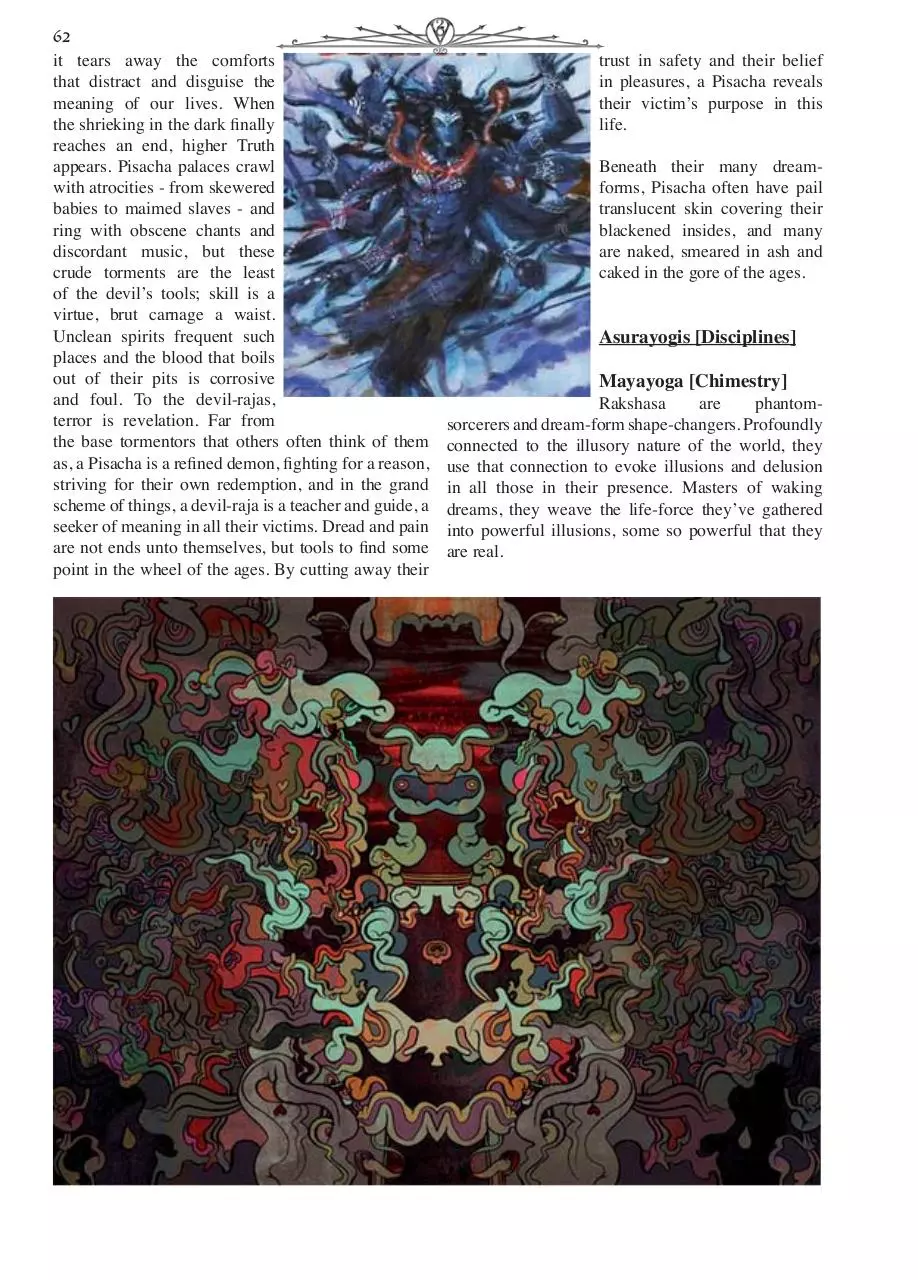Chronical Guide VtM Pgs 61 65.indd (PDF)
File information
Title: Chronical Guide VtM.indd
Author: Penguin
This PDF 1.5 document has been generated by Adobe InDesign CS4 (6.0) / Acrobat Distiller 9.0.0 (Macintosh), and has been sent on pdf-archive.com on 14/04/2011 at 16:59, from IP address 76.15.x.x.
The current document download page has been viewed 1253 times.
File size: 462.78 KB (5 pages).
Privacy: public file





File preview
61
Pisacha
Historically arising from the human Kshatriyas, the
warlords of India, the Pisacha are a fierce society of
nightmare warriors. Though other Kindred may think
of the court as a council, these wrathful monsters
often think of themselves as the Rakshasa Princes
of the Court of Infinite Thunders and still maintain
the lands that were concurred by Lanka in the dim
nights of the primordial past. Still, none of them
have been able to claim ascendance over their own
clan since the ancient Maharaja Vibhishana, the
great warrior-philosopher who taught the Rakshasa’s
dharma (mayapisatya) five thousand years
ago. Having eluded the karmic wheel, they
no longer have any place in the human
world; they have no loyalties to family,
religion or politics. Though many Pisacha
strive to be righteous demons, these fallen
warriors know honor is another illusion,
pleasure is just a sedative and fear is the
only true motivator.
The devil-rajas sit in judgment on
every Kindred in their territory,
teaching by torture and passing
down death-sentences on
those that don’t learn their
lesson. Thus, the other
Kindred of the Infinite
Thunders try to escape the
devil-raja’s notice, avoiding
the appearance of decadence,
aggression or worldly ambition. Though
the Pisacha tend to think of the materialistic
power-hungry among the Kindred as their
rightful victims,
ascetics and spiritually minded philosophers hold no
interest to the rajas.
The Pisacha are the most likely Rakshasas to be found
in the burnt husk of the Demon City of Lanka (the
unearthly Hell of Living Nightmares). There, they
train themselves in the arts of war and torture, preying
on the Sakti (blood) that feeds the realm and launching
raids on the astral gods and preta-loka (ghost-world).
They traditionally take it upon themselves to guard the
earthly territory of Lanka from the militant advances
of western and eastern Kindred. In service to the wheel
of ages, they teach their enemies the lessons
of suffering and pain, burning away their
desires for conquest and their attachments to
survival. Those who need to learn most are
taken from this world to hell, where the
Pisacha give their victim’s unending terror
(and eventual inner liberation from the
chains of fear… or sanity) as a sacrifice
to Ravana.
All Rakshasa bear a deep connection
to the realm of the demon king. The
instant they lost the purpose in this
life, they found themselves in
the nightmare-hell, where they
were reborn. While some
souls scream through that
infinite instant in Lanka,
others enjoy the trip and bring
its torments back to the world
with them. To these souls, the
nightmare of pain and fear is
a mantra of hope. Fear is a
cleansing thing to the Pisacha;
62
it tears away the comforts
that distract and disguise the
meaning of our lives. When
the shrieking in the dark finally
reaches an end, higher Truth
appears. Pisacha palaces crawl
with atrocities - from skewered
babies to maimed slaves - and
ring with obscene chants and
discordant music, but these
crude torments are the least
of the devil’s tools; skill is a
virtue, brut carnage a waist.
Unclean spirits frequent such
places and the blood that boils
out of their pits is corrosive
and foul. To the devil-rajas,
terror is revelation. Far from
the base tormentors that others often think of them
as, a Pisacha is a refined demon, fighting for a reason,
striving for their own redemption, and in the grand
scheme of things, a devil-raja is a teacher and guide, a
seeker of meaning in all their victims. Dread and pain
are not ends unto themselves, but tools to find some
point in the wheel of the ages. By cutting away their
trust in safety and their belief
in pleasures, a Pisacha reveals
their victim’s purpose in this
life.
Beneath their many dreamforms, Pisacha often have pail
translucent skin covering their
blackened insides, and many
are naked, smeared in ash and
caked in the gore of the ages.
Asurayogis [Disciplines]
Mayayoga [Chimestry]
Rakshasa
are
phantomsorcerers and dream-form shape-changers. Profoundly
connected to the illusory nature of the world, they
use that connection to evoke illusions and delusion
in all those in their presence. Masters of waking
dreams, they weave the life-force they’ve gathered
into powerful illusions, some so powerful that they
are real.
63
Pashuyoga [Ferality]
Ravenous beasts, animals driven by hunger and want,
the Rakshasa have a spiritual connection to the feral
predators of the world who share in their base drives.
Amarmayoga [Fortitude]
Stagnant and unchanging, the Rakshasa are immune
to harm, resisting even the rays of the twilight sun and
the burning touch of flame.
Pisacha’s Curse
Vetala
Seducers, magicians, rogues and tricksters, Vetala are
the most common Rakshasas in India and the Orient.
They take the Rakshasa’s dharma (mayapisatya)
as the ultimate purpose in all their machinations,
manipulations and deceptions- slowly unraveling the
disguises of those that fall in their web of delusions
to discover that person’s purpose in this life. Unlike
their masochistic Pisacha cousins, the Vetala are
fascinated with humans, preferring the mortal world
to the stagnancy of their own kind; how else are they
to understand how to return to the karmic wheel?
The Pisacha are compulsively brutal Rakshasa, and
are drawn to inflict some violent act on their victims,
almost always the helpless and week; mass-murder,
rape, mutilation, all feed some perversity deep within
the devil rajas. Like all Rakshasa, Pisacha’s are Historically arising from the merchants, artisans
compelled to engage in some vice or debachery, but and laborers of India, the Vetala still peddle their
for the Pisacha, this vice is always a vilent victization
of the helpless or week.
64
matter of practicality to the dream-demons
trade of deception and trickery. When Kindred
insist on breaking Avidyā and can’t be
dissuaded or deterred from their violations,
most Vetala simply leave the area, moving on
to less dangerous territories. Still such persistent
breakers-of-the-veal quickly find themselves in
the twisted clutches of the devil-rajas.
trade; revelation through deception and clarity
through delusions. To the dream-demons,
this fool’s-gold holds more value than the
sorcerous services and tangible
goods that their clients think
they want. The Vetala ply the
devil’s deal with a smile, but
their promises always have a
double-meaning and a sense
of irony, teaching their clients
what’s really important to
them, gaining what they want
and loose what really matters.
Having the most interaction
with humans, the Vetala
maintain Lanka’s equivalent
of the Masquerade, a tradition
of hiding from mortal eyes,
disguising the predations of
young or foolish Kindred
and convincing the people
of India that there are no real
monsters in the night. Some
many say that this tradition
of Avidyā (ignorance) is a
While Vetala still bear a deep connection to the
unearthly Demon City of Lanka, they usually
prefer their own dreams to the horrors of the
realm of Ravana. In the ancient nights, many
Vetala couldn’t let go of their attachments
to the family and village they’d
once known, remaining as
outcast protectors until driven
off, there after perpetually
traveling through a sea of
mortal-faces and brief-lives
as they learn the mayapisaty.
In modern nights, their
attachments are to life-style
more than location or lineage,
and most Vetala begin their
wandering within the first few
years of the change. Though
they make up the majority
of Kindred in India, they are
only peripheral members
of the Infinite Thunders
Court, putting little stock
in politics or diplomacy,
and instead depending on
their own manipulations
65
favor pure white, jade or softly
glowing blue skinned dreamforms.
and deceptions to manage the
conflicts of Kindred kind.
While their twisted lordly
cousins inflict illusory suffering
and terror, the Vetala prefer the
soothing dreams of wonder and
pressure; all the better with which
to tempt the vices and desires of
their clients. Many Vetala style
themselves as merchants of
magical artifacts and sorcerous
spells in a market of oddities.
Through their travels, the Vetala
have spread far an wide, traveling
through Asia in many guises.
Mara
Some Vetala in the Golden Courts
of Bengal, Thailand and the jungles of Southeast Asia
follow the tradition of feminine seduction as Mara.
These entrancing women are unearthly temptresses
and demonic concubines who surround themselves
with magical beauty, though the blood-thirsty tiger
is never far behind. Male or Female, all Mara are
women, and appear full of sanguine Yang-chin, alive
and aroused.
Rasetsuten
Among the Gaki Kuei-jin of Japan and Korea,
the Vetala Rakshasa are known as Rasetsuten,
dishonorable merchants and performers from the hells
of Yomi. There, they are conjurers of ghost-flame,
dream-eaters and theater-demons, hated as pests and
lowly con-artists by the Kuei-jin Courts.
Asurayogis [Disciplines]
Mayayoga [Chimestry]
Rakshasa are phantom-sorcerers
and
dream-form
shapechangers. Profoundly connected
to the illusory nature of the
world, they use that connection
to evoke illusions and delusion
in all those in their presence.
Masters of waking dreams, they
weave the life-force they’ve
gathered into powerful illusions,
some so powerful that they are
real.
Pashuyoga [Ferality]
Ravenous beasts, animals
driven by hunger and
want, the Rakshasa have
a spiritual connection to
the feral predators of the
world who share in their
base drives.
Amarmayoga
[Fortitude]
Stagnant and unchanging,
the Rakshasa are immune
to harm, resisting even
the rays of the twilight
sun and the burning touch of flame.
With the skin of a freshly drowned corpse, Vetala’s
stagnant Undead flesh is often paled grey and may
Vetala’s Curse
have a sickly green or bluish cast, though they tend to
Theft and gambling are the vices Vetala gravitate
towards. While material possessions mean
little to the conjurers of dream-realities and
gambling is no contest for the illusion weavers,
it’s the taking of what was someone else’s and
the thrill of victory by chance that draws the
Vetala to these activities. While a self-controlled
Vetala could easily cheat a lost bet, most won’t
risk ruining the next contest of chance and will
grudgingly fulfill at least the letter of their lost
wager. Thus the dream-demons word their
wagers carefully, inlaying double-meanings
and loopholes.
Download Chronical Guide VtM Pgs 61-65.indd
Chronical Guide VtM Pgs 61-65.indd.pdf (PDF, 462.78 KB)
Download PDF
Share this file on social networks
Link to this page
Permanent link
Use the permanent link to the download page to share your document on Facebook, Twitter, LinkedIn, or directly with a contact by e-Mail, Messenger, Whatsapp, Line..
Short link
Use the short link to share your document on Twitter or by text message (SMS)
HTML Code
Copy the following HTML code to share your document on a Website or Blog
QR Code to this page

This file has been shared publicly by a user of PDF Archive.
Document ID: 0000029987.